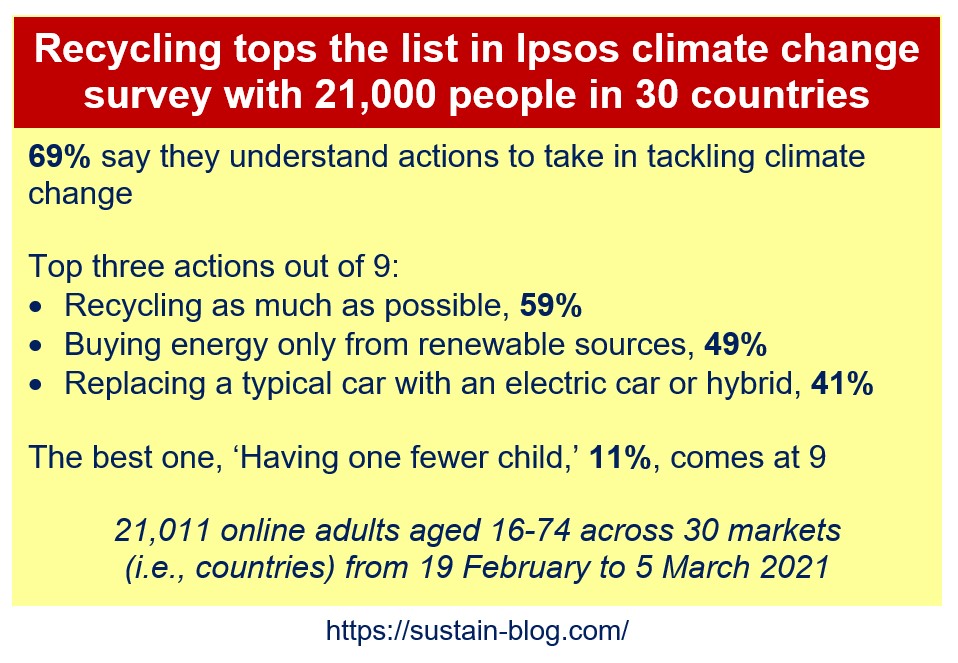By Asitha Jayawardena

7 out of 10 people say that they understand actions to take in tackling climate change in a survey by Ipsos of 21,011 online adults aged 16-74 across 30 markets (i.e., countries) from 19 February to 5 March 2021.
The knowledge
The question was, “I understand what action I need to take to play my part in tackling climate change.”
The markets are Argentina, Australia, Belgium, Brazil, Canada, China, Chile, Colombia, France, Great Britain, Germany, Hungary, Hong Kong, India, Italy, Japan, Malaysia, Mexico, the Netherlands, Peru, Poland, Russia, Saudi Arabia, South Africa, South Korea, Spain, Sweden, Switzerland, Turkey and the United States of America.
The global market average in agreeing to this is 69%. People in Peru (85%), Colombia (83%) Mexico (82%) and Chile (82%) scored most and those in Russia (41%) and Japan (40%) scored least. India (73%), Great Britain (71%), United States (65%) and China (64%) came in between.
But do we understand how to tackle climate change?
Behavioural perceptions
The question is, ‘From this list of options, which three do you think would most reduce the greenhouse gas emissions of an individual living in one of the world’s richer countries?’
Nine ways of reducing greenhouse gas emissions are as follows, with the rank inside the brackets. For example, the top is ‘Recycling as much as possible’, with 59%. The rank in brackets is decided by how much CO2 saved in tonnes annually and, in this case, is No 7 out of 9 because it saves 0.2 tonnes in CO2 every year.
- Recycling as much as possible, 59% (7)
- Buying energy only from renewable sources (e.g., wind power, hydro-electric), 49% (4)
- Replacing a typical car with an electric car or hybrid, 41% (5)
- Replacing traditional incandescent lightbulbs with low energy compact fluorescent (CFL) or LED lightbulbs, 36% (9)
- Hang-drying their clothes, instead of using an electric or gas dryer, 26% (8)
- Avoiding one long-distance flight (lasting six hours or more), 21% (3)
- Not having a car, 17% (2)
- Eating a plant-based diet, 14% (6)
- Having one fewer child, 11% (1)
In terms of tackling climate change, the top three are:
- Having one fewer child, 11% (9 in the previous)
- Not having a car, 17% (7)
- Avoiding one long-distance flight (lasting six hours or more), 21% (6)
The top one, ‘Recycling as much as possible,’ is taken into account by 59% but, in terms of CO2 saved in tonnes annually (0.2 tonnes), it is 7.
The ninth one, ‘Having one fewer child,’ is taken into account by 11% but it is 1 (in brackets) with 58.6 CO2 tonnes annually.
The knowledge that we understand what we should do is not correct in this case. The most impactful actions are ranked too low while the least impactful actions ranked too high in terms of carbon savings.
Impacts of climate change
Displacement due to climate change
What displaces more people, climate and weather or conflict?
The question is, ‘In 2020, do you think more people suffered internal displacement as a result of conflict (such as war, criminal and political violence) or as a result of climate and weather-related disasters (such as hurricanes, storms and flooding)?’
The answer to this survey is as follows:
- Internal displacement due to climate 32%
- Internal displacement due to conflict 43%
However, in the first half of 2020, the causes of new displacements (million people) are:
- Due to climate and weather, 9.8M
- Due to conflict, 4.8M
Therefore, climate and weather accounted for two thirds (67%) of new displacements in the first six months of 2020.
The warmest years
Another question is, ‘The World Meteorological Organization collects annual global temperatures, to see whether they are rising or falling across the world. Records begin in 1850. Since 2015, how many years have been the warmest year on record?’
The correct answer is 6 years since 2015 and only 4% were correct, or only one in twenty-five of people.
The majority either underestimated (22%) or were unsure (73%) of how many years since 2015 have been the warmest on record.
Ipsos Perils of Perception: climate change
Over 21,000 in 30 countries believe that they know about climate change but, as the results suggest, they, unfortunately, don’t. In this survey, many other questions are there, for example, food.
Why don’t you see the full survey as given below?
More…
Ipsos Perils of Perception: climate change https://www.ipsos.com/en-ca/ipsos-perils-perception-climate-change
The climate mitigation gap: education and government recommendations miss the most effective individual actions https://iopscience.iop.org/article/10.1088/1748-9326/aa7541/pdf
2020 was one of three warmest years on record https://public.wmo.int/en/media/press-release/2020-was-one-of-three-warmest-years-record


Informative write-up. Regards.
LikeLiked by 1 person
Thank you
LikeLike
Thanks for caring about the planet and posting about sustainability. I believe the technical means are available, but we need enough individuals to care, make better choices, and push corporations and governments to shift their priorities. And from what I’ve read, recycling has a miniscule impact.
LikeLiked by 2 people
You are welcome. With regard to recycling, yes, it has a miniscule impact. See my post, please.
https://sustain-blog.com/2021/04/21/recycling-tops-the-list-in-ipsos-climate-change-survey-with-21000-people-in-30-countries/
Thank you.
LikeLike
I think each one of us can do something for the environment.
I started doing at home detergent for the washing machine since 4 years. I can tell you that I still use the same plastic containers since then.
Have a nice day 🙂
LikeLiked by 2 people
Doing something for the environment is a must at this time of the climate crisis. Well done for that. Have a nice day too! 😊
LikeLiked by 1 person
I think one thing that was failed to be taken into account is that climate change impacts are also likely to drive conflict especially in developing countries. Especially water related and grazing land related conflicts. Consequently driving the displacement as well. So climate change and conflict displacement can sort of be married together.
LikeLiked by 1 person
Yes. Displacement has not been taken into account, especially in Africa.
LikeLike